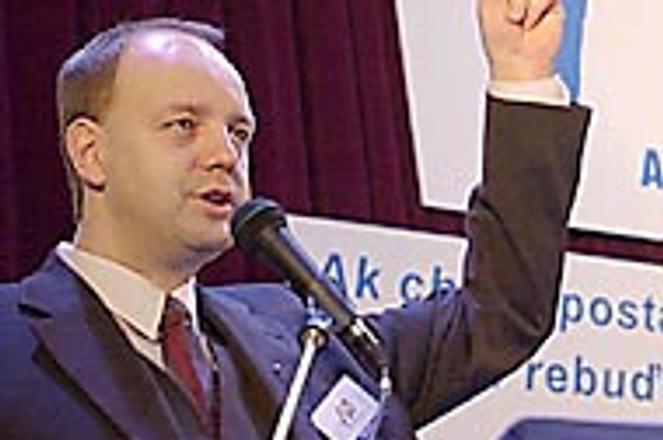Politician and Slovak media magnate Pavol Rusko presenting his party's views.photo: TASR
Weeks after a damning report was released by a media watchdog, political party leader Pavol Rusko has been stung by new evidence his media empire is being used for political gain.
Rusko, leader of the Ano (Alliance of the New Citizen) party and owner of Slovakia's most popular TV station, Markíza, was presented with the results of radio monitoring from the state Broadcasting and Transmission Council (RVR) October 9.
Radio Okey, which is believed to be heavily under the influence of Rusko, gave excessive airtime preference to Ano between April and May, said the council's report. Just 10 days earlier, independent media monitor Memo 98 had said Markíza had given a similar bias to the party in the same period.
"There was a preference shown for the non-parliamentary Ano party and its leader Pavol Rusko. This party received an excessively large time space in comparison with other parties," the RVR report said.
The reports by Memo and the RVR come just five months after Ano was founded. At the time Rusko promised the public that he would not use Markíza as a vehicle for his party.
"I utterly reject any suggestions that Markíza or Radio Okey is being used to support Ano," Rusko told The Slovak Spectator on October 13.
"There is a fundamental flaw in the monitoring methods used by Memo and the Broadcasting and Transmission Council in that they do not properly differentiate between the time given when a minister is talking as a government representative and as a party representative.
"Ano has no members of government, while Prime Minister Mikuláš Dzurinda's party has nine government members. The methods used make it impossible to provide a fair comparison."
News staff at Markíza said the station's own monitoring recorded different figures for airtime given to political parties in its news broadcasts to that offered by Memo.
"We have been monitoring our broadcasts and we have different figures," said Stanislav Pavlík, head of news broadcasting at Markíza. Rusko said that Markíza is preparing to release the results of its own monitoring from April to October.
Following both reports the Slovak Licence Council, which awards TV and radio licences, has said that there will be no legal action taken against either Markíza or Radio Okey. But Licence Council head Jarmila Grujbárová said her organisation would be paying close attention to past and present Markíza broadcasts.
Markíza dominates the Slovak market with 74% viewership, meaning that on any given day almost three-quarters of Slovaks tune into the station at least once. Since the formation of Ano, independent observers have voiced fears over the possible misuse of Markíza, despite Rusko's promise of objective political reporting on the channel.
The Memo report, released September 29, seemed to confirm those fears. In the report Memo said that of 15 news spots featuring Ano, 13 were positive and two neutral. Markíza broadcast 209 reports on the remaining 14 active political parties, 20 of which portrayed the parties positively and 189 negatively.
The RRTC report showed that Ano received 19% of air time on Radio Okey. The opposition HZDS and the coalition SMK got 14% while the coalition SOP received 13%. Other parties received what the council called "minimal airtime" and the non-parliamentary Smer party had just 1% of airtime.
Memo's report showed that Ano also received considerably more broadcast space than Smer - 6.4% and 2.4% respectively - although both are non-parliamentary groups. Ano received 1.3% of airtime on state channel STV.
The report also highlighted the use of what Memo termed "media effects" to promote a positive image of the party.
"Coverage of Ano activities included impressive takes of citizens cheering and applauding upon the arrival of party representatives, and speaker comments referring to valleys of hunger. This built an image of Ano as saviours.
"Ano representatives were often chosen as professionals commenting upon pressing current political and social issues (health-care, education) in news broadcasts. Their comments in almost all instances exceeded the time awarded to reactions of representatives of the discussed sector, and the standpoints of Ano representatives were presented without alternative solutions proposed by other political parties for comparison," the report read.
With elections 11 months away, Memo's Rastislav Kužel warned the situation was only likely to worsen. "With just under a year to go to the elections, politicians are now just beginning to wake up to what they can do with television," he said.
"Markíza completely dominantes the Slovak TV market, and all attempts by other TV channels to undermine that position have failed. What we have seen on Markíza is huge criticism of the government, and that criticism has increased since the formation of Ano."
Kužel also argued that Rusko had shown an "exaggerated reaction" to the Memo report because it had "hurt his media image as a politician".
"Memo hit Markíza in a sensitive spot. He's attacked our methods of monitoring, but we've been doing this for three years and work in different countries using internationally accepted monitoring methods," he said.


